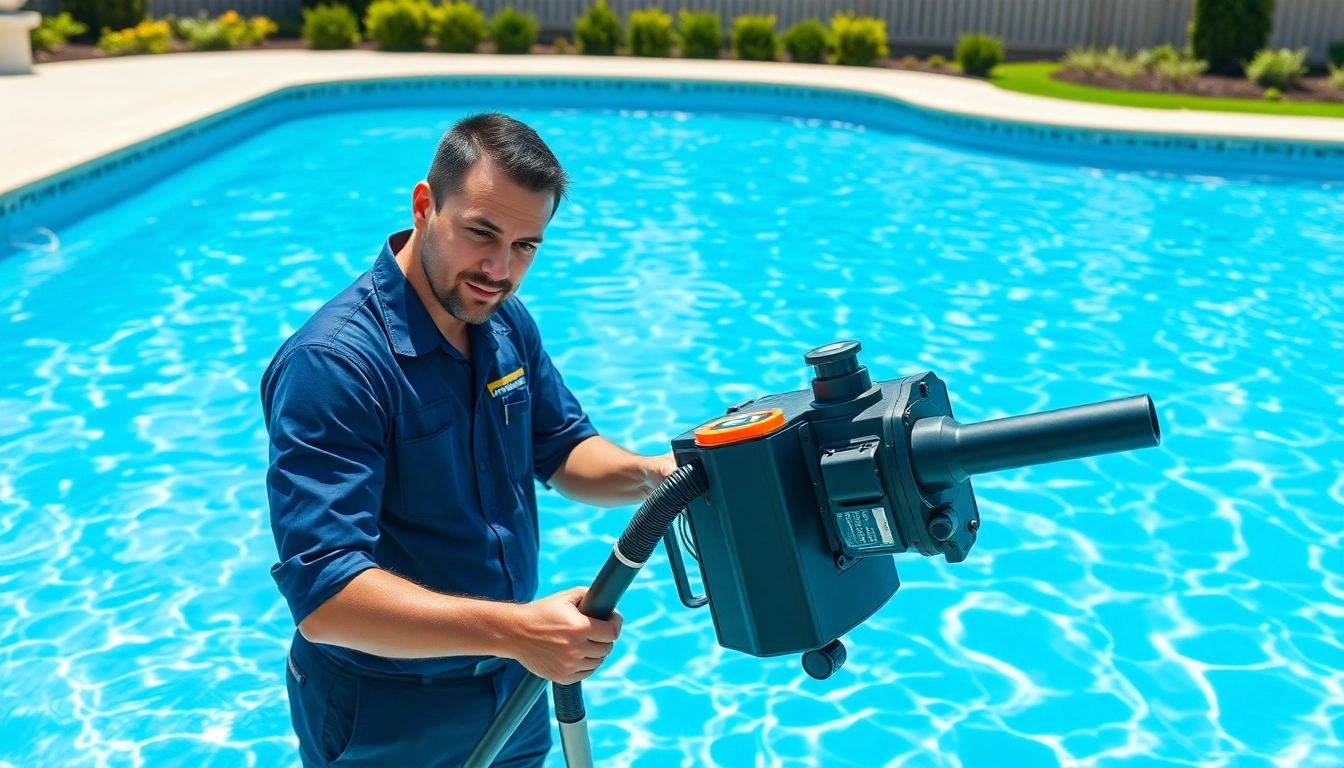Understanding Pool Services
When you think about enjoying a refreshing swim on a hot summer day, it’s easy to overlook the vital role that pool service plays in keeping your oasis safe and enjoyable. Whether you are a new pool owner or have had a pool for years, understanding the variety of services available can help ensure your investment remains in pristine condition. If you’re looking for reliable pool service near me, educating yourself on what these services encompass is a great first step.
What Does Pool Service Near Me Include?
Pool services can vary significantly depending on your needs and location. However, there are some common elements that are typically included in standard pool service packages. These often consist of:
- Regular Cleaning: This includes skimming the surface for debris, vacuuming the bottom, and brushing the walls to prevent algae growth.
- Chemical Balancing: Ensuring the proper chemical levels is crucial for maintaining pool health. Services will test and balance pH, chlorine, alkalinity, and more.
- Filter Maintenance: Regular checks on filter systems to guarantee they are functioning correctly.
- Equipment Inspections: Routine assessments of pumps, heaters, and other equipment to ensure optimal operating conditions.
- Seasonal Preparations: Opening and closing services catered to your geographical needs, including winterizing your pool.
The Importance of Regular Pool Maintenance
Regular pool maintenance is not just a luxury; it is essential for safety, longevity, and aesthetics. Without proper care, pools can develop issues like algae growth, which can pose health risks, and mechanical failures that may lead to costly repairs. Regular service ensures that:
- Water Quality: Keeping chemical levels balanced prevents harmful bacteria and pathogens from thriving.
- Extended Lifespan: Maintaining your pool correctly can prolong the lifespan of equipment, surfaces, and amenities.
- Aesthetic Appeal: Clean pools are more inviting, enhancing your outdoor space’s overall look.
Service vs. DIY: Pros and Cons
Many pool owners face the dilemma of choosing between professional services and DIY maintenance. Here’s a breakdown of both approaches:
Pros of Professional Services
- Expert Knowledge: Professionals are trained and experienced in handling various pool issues.
- Time-Saving: Hiring a service frees you up to enjoy your pool more and worry less about its maintenance.
- Comprehensive Services: They often provide a range of services beyond basic cleaning, such as repairs and seasonal preparations.
Cons of Professional Services
- Cost: Professional services can add up over time, especially for frequent visits.
- Dependency: You may become reliant on external help for routine issues you might otherwise handle.
Pros of DIY
- Cost-Effective: It can save you money in the long run if you have the time and knowledge.
- Satisfaction: Many find joy in maintaining their own spaces, leading to a stronger connection with their property.
Cons of DIY
- Learning Curve: If you lack experience, you could make mistakes that might be costly in the long run.
- Time Investment: Pool maintenance can be time-consuming, taking you away from other activities.
Choosing a Pool Service Provider
Choosing the right pool service provider can make a significant difference in the quality of your pool maintenance experience. The right partner will not only keep your pool running smoothly but will also offer peace of mind.
Key Qualities to Look For
When selecting a pool service provider, consider the following qualities:
- Experience: Look for a provider with a solid track record and years of experience in the industry.
- Certifications: Valid licensing and certifications ensure that they comply with local regulations and maintain professional standards.
- Reputation: Online reviews and testimonials from previous clients can provide insight into the company’s reliability.
- Comprehensive Services: A one-stop-shop for various pool needs will save you the hassle of managing multiple contractors.
How to Verify Credentials and Reviews
Before committing to a pool service, verifying their credentials and reading customer reviews is essential. Here’s how:
- Check their website for certifications and licenses.
- Consult online review platforms like Yelp, Google Reviews, and Community Forums to gauge customer satisfaction.
- Ask for references from previous clients to get firsthand accounts of their experiences.
Questions to Ask Before Hiring
Before hiring a pool service provider, don’t hesitate to ask questions. Here are some important ones:
- What services do you offer, and how often will you service my pool?
- Can you provide a detailed quote, and are there any potential extra charges?
- What is your policy on cancellation or rescheduling?
- How do you handle pool repairs if needed?
Types of Pool Services Offered
Understanding the specific services offered by pool companies will help you select the right one based on your needs. Here are some of the most common services provided:
Cleaning and Chemical Balancing
Regular cleaning and chemical balancing are fundamental aspects of pool maintenance. These services typically include:
- Skimming debris off the water surface to reduce algae growth.
- Vacuuming pool surfaces and cleaning tiles.
- Testing and balancing water chemical levels to prevent any health risks.
In-depth chemical testing involves checking pH levels, alkalinity, and the concentration of free chlorine, ensuring the swimming environment is safe and inviting.
Repairs and Equipment Maintenance
Pool equipment often requires repairs and maintenance, which can include:
- Pump evaluations for performance and leak detection.
- Heater repairs to ensure water temperatures are regulated.
- Filter cleaning or replacements to maintain water clarity.
These services help prevent more significant issues from arising and ensure that your pool remains operational all season long.
Seasonal Preparations and Closings
Each season brings specific needs for pool care. Seasonal services include:
- Opening Services: Preparing a pool for summer by cleaning the cover, reassembling equipment, and testing water quality.
- Closing Services: Winterizing a pool to avoid damage during cold months, including draining water and adding winterizing chemicals.
Cost of Pool Services
The cost of pool services can vary widely based on several factors. Understanding these factors will help you budget effectively.
Factors Affecting Pool Service Prices
Here are the major factors that influence the cost of pool services:
- Pool Size: Larger pools require more time and resources to maintain.
- Service Frequency: Weekly or bi-weekly services will cost more than monthly visits.
- Location: Geographic location can affect transportation costs and local wage averages.
- Type of Services: The complexity of the services (e.g., repairs vs. routine cleaning) will impact pricing.
Average Pricing for Common Services
While prices can differ, average costs for common pool services typically range as follows:
- Pool cleaning: $100 – $200 per visit
- Chemical balancing: $50 – $150
- Seasonal opening and closing: $150 – $500
- Equipment repairs: Varies widely, often $100 – $400
How to Create a Budget for Pool Maintenance
Budgeting for pool maintenance involves considering both routine expenses and unexpected costs:
- Calculate the expected monthly and seasonal service costs based on quotes received.
- Set aside an emergency fund for repairs and replacements that may arise throughout the year.
- Consider setting a budget for additional enhancements like equipment upgrades or aesthetic improvements.
Advanced Pool Care Techniques
For those looking to elevate their pool care routine, implementing advanced techniques can significantly improve your pool’s condition and efficiency.
Water Quality Testing and Management
Effective water testing extends beyond pH and chlorine. Advanced testing methods can include:
- Using robotic testers that provide more comprehensive, real-time data for precise balancing.
- Sampling water from multiple pool areas to detect any uneven distributions in chemical levels.
Regularly monitoring water quality helps prevent issues like algae bloom or cloudiness, creating a healthier swimming environment.
Improving Pool Efficiency: Tips and Tricks
Improving your pool’s efficiency can lead to significant cost savings and reduced environmental impact. Here are some strategies:
- Install a variable speed pump, which can reduce electricity costs up to 70% compared to single-speed pumps.
- Utilize solar covers to maintain heat and decrease evaporation, saving both energy and water.
- Incorporate a smart pool controller that allows remote monitoring and management of your pool’s systems, optimizing performance.
Innovative Technologies in Pool Care
The world of pool maintenance is rapidly evolving, with new technologies providing innovative solutions for care:
- Automatic pool cleaners have advanced, offering improved suction and navigation for thorough cleaning.
- Integrated water monitoring systems can notify you of chemical imbalances directly on your smartphone.
- Smart heaters can adapt to temperature changes and usage patterns, optimizing energy consumption.



